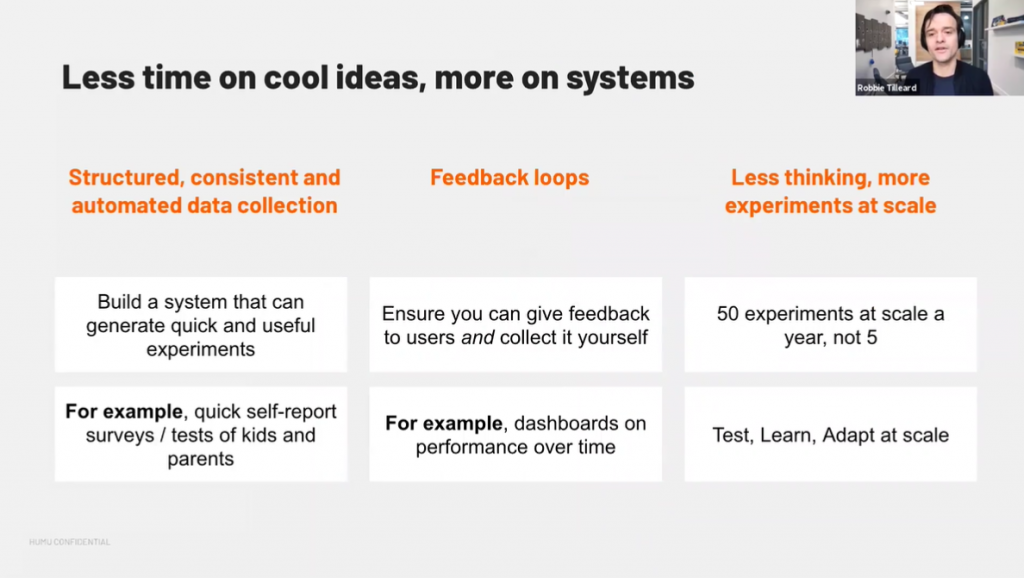
The EQ Guest Speaker: Robbie Tilleard
Increasing happiness at work: approaches in behavioural science, policy & technology
We were delighted to have Robbie Tilleard as a guest speaker at The EQ to discuss ‘Increasing happiness at work: approaches in behavioural science, policy & technology.’
Robbie is the Head of People Science and Solutions for Humu in EMEA. Humu is a behavioural change company that makes work better through science, machine learning, and a little bit of love. At Humu, and his previous role at The Behavioural Insights Team (the UK’s Nudge Unit), Robbie has led projects applying behavioural science and evidence-based methods to solve organisational challenges. This includes launching new initiatives to enhance wellbeing, improve diversity and inclusion, increase manager and leader effectiveness, and help firms adopt new practices and technologies.
Humu’s mission is to ‘make work better’, but how do you really build a great and human-centred workplace? Robbie started by discussing several common strategies that organisations use to try and build a culture, however, “it turns out a lot of it is actually built on sand”. Top-down leadership, mentoring, and training sessions are amongst some of these strategies which do not show much lasting impact, so what Humu really cares about is implementing evidence-based processes in HR departments. Humu works with thousands of organisations, delivering ‘nudges’ from their Nudge Engine which drives sustainable results for employees and the business. The process behind this, Robbie explained, is that they gather data about the organisation, survey the employees, and present the results to the company about the current situation. They then send people personalised nudges – “small, individualised moments to help create a better choice environment around what they might understand to be best practices in the workplace.” They then collect data on what people like and dislike and how they change over time, which allows Humu to learn and repeat as they go along.
Robbie shared three trends that Humu has observed in the workplace in recent months. Firstly, they found that people who worked from home prior to COVID-19 did not find the adjustment much easier than those who had never worked from home. They also found that now is the time for empathy, flexibility, team norms and emotional support, as they have all been seen to help people adjust to working during the pandemic. Secondly, Robbie explained that where manager training failed, nudges worked. At a major tech company, Humu assessed the impact of training on manager behaviour and found it had no lasting results. However, when managers and employees were sent nudges, managers were rated more effective by their employees. Thirdly, Robbie explained that when it comes to job retention, your opinion of your peers matters more than your opinion of your manager: “If you’re in a team where you’re the only one in your team who dislikes your manager, you’re going to be a retention risk. But if every single one of you dislikes your manager, then it’s a very different scenario because you have that camaraderie of your peers and a feeling of shared experience.”
Finally, Robbie discussed the next steps. “My challenge to evidence makers and policy makers is: are we building evidence that scales?” Using a classic example from behavioural science literature, Robbie talked about social norms. Robert Cialdini is the famous psychologist who had the idea that social norms really matter and the Behavioural Insights Team successfully tested this idea with taxes. But what Humu has found is that social norms are very difficult to apply, as we don’t really know all the mechanisms that take place to drive its success. Robbie believes this is because it takes many years to get results. The question is then, as policy makers, how do you build systems of quick feedback loops for evidence? Robbie explained how they solve this at Humu, emphasising that technology and investment is required. Humu has a platform where they are gathering data and building on it over time, which allows them to experiment faster. Robbie believes the key is “less time on cool ideas, more on systems”.

During the discussion, we talked about the practicalities of collecting data from different organisations, and the techniques Humu uses to measure wellbeing. We discussed the rules that Humu has in place to ensure honest survey responses, particularly in smaller teams. We also talked about the statistical power of smaller groups, especially when running multiple interventions at the same time. Robbie explained some of the techniques that Humu uses to show statistical significance and commented that the skill is to present results that are “both robust but also meaningful to people who frankly are not dealing with statistics every day”.
To replay this event, please log in to The EQ Hub. To learn more about becoming a member of The EQ, please click here.
